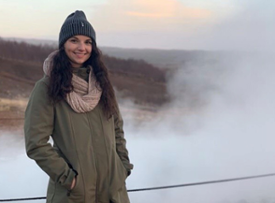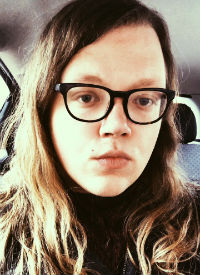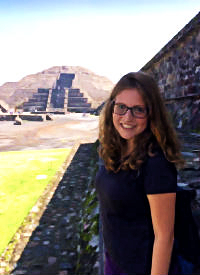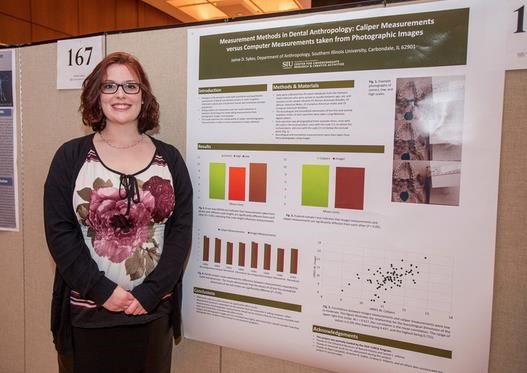Previous Winners
Learn more about the Undergraduate Essay Award and recent winners here.
2021
CHELSI GREEN
Throughout much of Northern Europe, a wide variety of depositions have been uncovered in wetland environments. These depositions range from weapons to animals remains to food stuffs and from ornaments and various metallurgic objects to wooden anthropomorphic figures to human remains. This practice of wetland depositions raises some questions. The number of wetland depositions sites would seem to indicate that these locations held some significance to the peoples who performed the depositions. Yet what is it about these locations that made them significant to these people? Furthermore, why were these particular objects chosen to be included in wetland deposits? Ultimately, through the combined examination of the locations of wetland depositions and the deposited object, this paper seeks to answer the question, what can be suggested about the worldview and early religious practice of wetland deposition of the Late Bronze and Early Iron Age peoples in Northern Europe?
2019
Co-winners Karlie Good and Erin Woolard
Karlie Good
 Karlie looks at the different struggles that are faced by the homeless population in her paper The Struggles Faced by the Poverty Stricken Urban and Rural. She wanted to see if homeless people living in urban and rural areas were facing the same struggles due to the environment and location that each are in. She interviews individuals living in shelters in Chicago as well as Southern Illinois. She found that the main struggles faced amongst the urban poor were food stability and the high cost of living. In contrast, her results showed that the main struggles for the homeless population in rural areas were finding a job and the lack of public transportation the town has to offer.” Although both areas had different struggles, she realized they had one on common: people had felt they had lost their self-purpose in life. Her favorite part of the experience was getting to meet people and having them feel comfortable enough with her to share their stories.
Karlie looks at the different struggles that are faced by the homeless population in her paper The Struggles Faced by the Poverty Stricken Urban and Rural. She wanted to see if homeless people living in urban and rural areas were facing the same struggles due to the environment and location that each are in. She interviews individuals living in shelters in Chicago as well as Southern Illinois. She found that the main struggles faced amongst the urban poor were food stability and the high cost of living. In contrast, her results showed that the main struggles for the homeless population in rural areas were finding a job and the lack of public transportation the town has to offer.” Although both areas had different struggles, she realized they had one on common: people had felt they had lost their self-purpose in life. Her favorite part of the experience was getting to meet people and having them feel comfortable enough with her to share their stories.
Erin Woolard
 Erin’s paper, Keeping Culture: How International Students Maintain Ethnic Identity, is an exploration of methods of cultural preservation practiced by international students. Erin developed a strong interest in international student life from her own experiences studying abroad at universities in Malta, Spain, and Cuba. Erin interviewed six students at SIU to determine if they worried about a deterioration of their ethnic identities and if, in order to prevent this loss, they then intentionally incorporated cultural activities into their daily lives in the U.S. She interviewed an equal number of male and female students as she was also interested to know if men and women felt differently about these subjects. In performing this study Erin learned about an understudied aspect of the international student experience and also gained insight into what factors contribute to the degree of confidence and security these students have in their cultural identities.
Erin’s paper, Keeping Culture: How International Students Maintain Ethnic Identity, is an exploration of methods of cultural preservation practiced by international students. Erin developed a strong interest in international student life from her own experiences studying abroad at universities in Malta, Spain, and Cuba. Erin interviewed six students at SIU to determine if they worried about a deterioration of their ethnic identities and if, in order to prevent this loss, they then intentionally incorporated cultural activities into their daily lives in the U.S. She interviewed an equal number of male and female students as she was also interested to know if men and women felt differently about these subjects. In performing this study Erin learned about an understudied aspect of the international student experience and also gained insight into what factors contribute to the degree of confidence and security these students have in their cultural identities.
2018
Co-Winners Melanie Bolling and Mikaje Questelle
Melanie Bolling
 Melanie’s paper, Food Relationships: Encampment, Identity, Security, and Home, is about the tangible power food holds when people are displaced. The displaced people that I looked at in this paper are survivors or victims of; Prisoner of War camps, refugees, and the Jewish diaspora. The connection to food through the lenses of home, identity, security and encampment were used to build the argument that food is crucial to people in more ways than just nutritional value. The creation of community surrounded by the conversation of food or meals allowed for survival. These observed relationships led me to explore the need for food for more than just nutrition in all of these encampments.
Melanie’s paper, Food Relationships: Encampment, Identity, Security, and Home, is about the tangible power food holds when people are displaced. The displaced people that I looked at in this paper are survivors or victims of; Prisoner of War camps, refugees, and the Jewish diaspora. The connection to food through the lenses of home, identity, security and encampment were used to build the argument that food is crucial to people in more ways than just nutritional value. The creation of community surrounded by the conversation of food or meals allowed for survival. These observed relationships led me to explore the need for food for more than just nutrition in all of these encampments.
Mikajah Questelle
 Having shown a distinct interest in tricksters, ritual and magic, it should surprise few (if any) that Kaje would dedicate his research to Exú, the trickster-figure born in Yorubaland (West Africa) but whose roots have been supplanted into the soils of the New World (Brazil). In writing At the Crossroads of Influence: Exu as an Instrument of Social Change in Brazil, Kaje shows concern for the historical root of Exú (Èṣù) in Africa and some of specifics characteristics possessed by his Brazilian remembrance and reimagination. More so, however, Kaje focuses on unearthing commonalities in an attempt to expose the true heart of Èṣù/Exú and his various functions. No discussion of Exú would be complete without considering his relation to both gender and race as manifest in Africa and Brazil, a topic Kaje has expressed interest in pursuing more pointedly in the future. What Kaje elucidates, then, is the efficacy of Exú as both instigator of social change and maintainer of social order, and how these functions continue to be of great importance to his devotees.
Having shown a distinct interest in tricksters, ritual and magic, it should surprise few (if any) that Kaje would dedicate his research to Exú, the trickster-figure born in Yorubaland (West Africa) but whose roots have been supplanted into the soils of the New World (Brazil). In writing At the Crossroads of Influence: Exu as an Instrument of Social Change in Brazil, Kaje shows concern for the historical root of Exú (Èṣù) in Africa and some of specifics characteristics possessed by his Brazilian remembrance and reimagination. More so, however, Kaje focuses on unearthing commonalities in an attempt to expose the true heart of Èṣù/Exú and his various functions. No discussion of Exú would be complete without considering his relation to both gender and race as manifest in Africa and Brazil, a topic Kaje has expressed interest in pursuing more pointedly in the future. What Kaje elucidates, then, is the efficacy of Exú as both instigator of social change and maintainer of social order, and how these functions continue to be of great importance to his devotees.
2017
Grace Vargas
 Grace's paper "Chicha de Maiz: The Andean Beverage's Cultural Importance, and How We Know", was coursework for Anthropology 240C, Archeology with Dr. Izumi Shimada, in her sophomore year. She researched the cultural significance of Chicha beer in Andean societies over time, as well as how anthropologists have been able to determine this, which is in large part due to archeological evidence and processes. Her favorite part of the experience was analyzing Peruvian native Felipe Guaman Poma de Ayala’s compilation of writings and drawings documenting local Inca culture at the time of the Spanish Conquest, for relevant material. Learning about this complex history and legacy of the heritage beverage was fascinating and often, surprising. This project also provided an enjoyable opportunity for intersection with work in her Latino Studies and Spanish Language minors, and she hopes to focus on similarly relevant anthropological topics in the future.
Grace's paper "Chicha de Maiz: The Andean Beverage's Cultural Importance, and How We Know", was coursework for Anthropology 240C, Archeology with Dr. Izumi Shimada, in her sophomore year. She researched the cultural significance of Chicha beer in Andean societies over time, as well as how anthropologists have been able to determine this, which is in large part due to archeological evidence and processes. Her favorite part of the experience was analyzing Peruvian native Felipe Guaman Poma de Ayala’s compilation of writings and drawings documenting local Inca culture at the time of the Spanish Conquest, for relevant material. Learning about this complex history and legacy of the heritage beverage was fascinating and often, surprising. This project also provided an enjoyable opportunity for intersection with work in her Latino Studies and Spanish Language minors, and she hopes to focus on similarly relevant anthropological topics in the future.
2015
 Lauren Austin was awarded the 2015 Undergraduate Essay Award and has been interested in Archaeology for as long as she can remember, “I honestly feel so lucky to be here at SIU. My experience in the department has been so positive.” She has worked at the Center for Archaeological Investigations since Fall 2013, where she has gained applied experience in lithic and artifact analysis, data collection, and curation. Her minor is in history, which has contributed to a greater love for historic archaeology in the United States. After graduation in December 2015, she plans to enter graduate school here at SIU to further her anthropological education.
Lauren Austin was awarded the 2015 Undergraduate Essay Award and has been interested in Archaeology for as long as she can remember, “I honestly feel so lucky to be here at SIU. My experience in the department has been so positive.” She has worked at the Center for Archaeological Investigations since Fall 2013, where she has gained applied experience in lithic and artifact analysis, data collection, and curation. Her minor is in history, which has contributed to a greater love for historic archaeology in the United States. After graduation in December 2015, she plans to enter graduate school here at SIU to further her anthropological education.
 Caroline Robertson, from Dow, IL, was awarded the 2015 Undergraduate Essay Award. She is a senior here at SIU and will be graduating in August with her bachelor's degree in anthropology and a minor in history. This fall, she will be attending graduate school in Washington, D.C. at the American University to earn a MA in Public Anthropology. She plans on using her award winning paper, “Memories of the Herrin Massacre” as a springboard for further ethnographic studies in historical traumatic memories.
Caroline Robertson, from Dow, IL, was awarded the 2015 Undergraduate Essay Award. She is a senior here at SIU and will be graduating in August with her bachelor's degree in anthropology and a minor in history. This fall, she will be attending graduate school in Washington, D.C. at the American University to earn a MA in Public Anthropology. She plans on using her award winning paper, “Memories of the Herrin Massacre” as a springboard for further ethnographic studies in historical traumatic memories.
2014
 Jaime Sykes, originally from San Diego, California, has been awarded the 2014 Undergraduate Essay Award by Anthropology at SIU.
Jaime Sykes, originally from San Diego, California, has been awarded the 2014 Undergraduate Essay Award by Anthropology at SIU.
Her paper, entitled "Epigenetic Changes in Children Conceived During the Dutch Hunger Winter and the Question of Transgenerational Epigenetic Inheritance," discussed the possibility that traits which are acquired in utero could be genetically passed down to the next generation. Her paper focused on a case study of children impacted by the Dutch Hunger Winter at the end of World War II.
In her anthropology studies at SIU, Jaime is primarily interested in biological anthropology. She elaborated: “My research interests include the bioarchaeology of trauma and ritual violence, forensic taphonomy, osteometrics, and evolutionary theory. My ultimate goal is to complete my PhD in biological anthropology and become a bioarchaeologist and forensic anthropologist who conducts research in both bioarchaeology and forensic anthropology, teaches in a university setting, and works on forensic cases.”
2011

Rachael Huszar won the 2011 Undergraduate Essay Award. Rachael is an undergraduate student from Oshkosh, WI.
Her paper, "Black, Yellow, Tooth, and Claw: An Analysis of Jaguar Symbolism in South America," discussed the significance of the use of jaguars in mythic narratives for indigenous groups in South America.
After graduation, Rachael plans to attend graduate school for Museum Studies.
